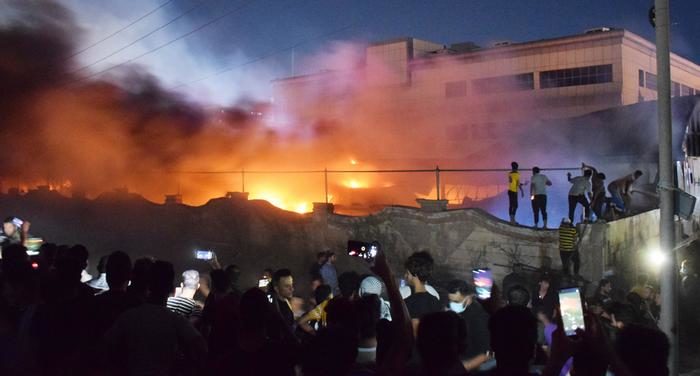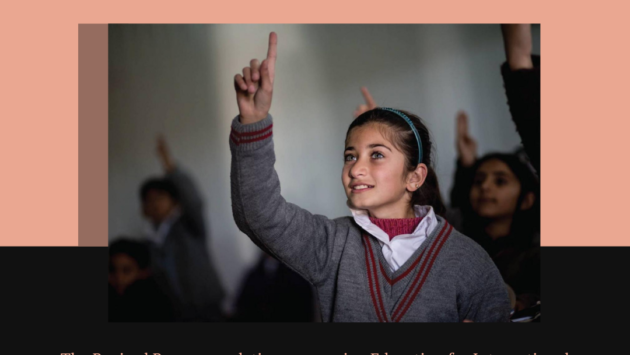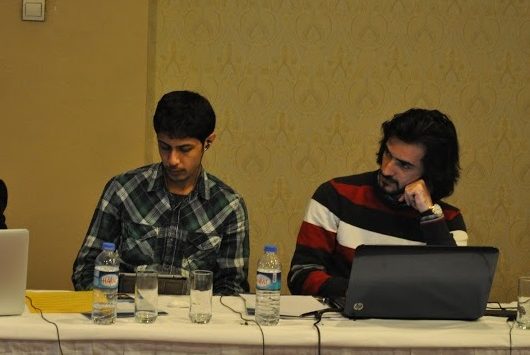Two Hospital Fires Point to Wider Problems in Iraq
A deadly fire has caused renewed outrage among Iraqis, tired of corruption and mismanagement of public resources after wars and international sanctions have already ravaged and stripped down the country’s health infrastructure.
The Republic of Iraq has been hit by the second tragic hospital fire in three months triggered by unsafe storage of oxygen in the treatment of mounting COVID-19 patients.
At least 92 people had died and 100 were injured after an oxygen canister exploded due to an electrical short circuit on Monday 12 July 2021 at the Imam Hussein Teaching Hospital in the southern city of Nasiriya, close to Baghdad.
According to reports, a heavy crane was used to remove charred remains at the site as relatives watched.
Complaints among bystanders quickly started circulating that the response was too slow and that fire trucks had run out of water. Most casualties were patients at the hospital, some connected to ventilators, while staff could reportedly escape.
“The whole state system has collapsed, and who paid the price?” said one witness, “The people inside here. These people have paid the price”, he said.
Others said the tragedy was predictable, as hospitals lack the funding to ensure basic safety measures — sprinklers, fire alarms — indicative of the country’s wider public infrastructure and healthcare crisis.
In response, protesters are demanding justice and accountability, pointing to mismanagement and corruption in the federal and provincial governments.
“We want the government to put everyone who manages this Ministry of Health in jail”, said one protester.
Arrests followed the incident, with Prime Minister Mustafa al-Kadhimi ordering the detention of the provincial health director in the province of Dhi Qar, where Nassiriya is located, the civil defence chief and hospital director.
A Nasiriya court also said it had ordered the arrest of 13 local officials in association with the fire.
Similar responses ensued after a blaze earlier in 2021 claimed more than 80 people in a hospital treating COVID-19 patients in Baghdad, triggering the resignation of Iraq’s health minister.
“The absence of accountability and punishment as well as impunity encourages officials to not care for safety measures in such institutions, so that’s why the fire happened”, said Ali Al Bayati from the Iraqi Human Rights Commission, urging the government to reopen an investigation into cumulative corruption and negligence since 2003.
As of 15 July 2021, Iraq has experienced 1.47 million cases of COVID-19, and around 17,700 deaths since the onset of the pandemic, one of the most affected countries in the Middle East. However, actual numbers are expected to be higher, with rising cases and hospitalisations adding pressure to an already precarious healthcare system and delicate public health situation.
Chronic conditions such as cancer, heart disease and lung illnesses make up more than half the number of deaths in Iraq. In addition, a third of the population is obese and a third suffer from hypertension. Fourteen percent of Iraqis have diabetes.
What’s more, population increases have outpaced the scaling up of the health system and there are only 1.3 hospital beds for every 1,000 of the country’s nationals, as laid out in a Reuters investigation in 2020.
One year on from the coronavirus pandemic, the health sector still can’t respond to the emergency due to a weakened infrastructure from decades of war, international sanctions and neglect, as well as corruption.
Iraq’s officials allocate less public money to healthcare — 4.5 percent of its annual budget — than other neighbouring countries in the region, including less well-off states like Jordan, which spent 257 dollars per person compared to 154 dollars per person by Iraq on health services, according to WHO figures.
The number of health workers is low, and some of the country’s brightest and best medical personnel have fled the country or chosen to work abroad, contributing to brain drain in the sector. There is also a shortage of medical supplies and no proper guidelines around waste disposal.
The low quality public healthcare means Iraqis bear the brunt of health costs by relying on the private sector instead. One report by Physicians for Human Rights stated, on average, Iraqis would cover 70 percent of out-of-pocket health expenses and may even try to access services abroad.
The war in 1991 was the first step in the reversal of what used to be an excellent standard of healthcare provision in the region, according to the Costs of War project.
The destruction of infrastructure that occurred in the 90s, in 2003 and again as ISIS took control of swathes of the country has meant that the same level of service has never been restored.
UN sanctions also led to a deterioration in public sector funding with doctors’ salaries unable to meet daily living costs. One health indicator demonstrating the decline in health services after 1991 is infant mortality, which rose from 29 per 1,000 in 1989 to 131 per 1,000 in under-fives between 1994 and 1999, according to a study by three medical schools in London, United Kingdom.
However, some argue there have been missed opportunities to rebuild these vital services during relative stability.
In 2019, the government only allocated 2.5 percent of a 106.5 billion-dollar budget to its health ministry, compared to 18 percent to its security forces and 13.5 percent to the oil ministry, according to Reuters.
On the night of the April 2021 fire, the hospital intensive care unit had four times the number of patients it was equipped for, plus visiting relatives. The New Humanitarian, in exploring the conditions leading to such a fire, reported from a local source, “You know how it works… If you don’t allow a person to be with their loved one, they say they’ll speak to someone high up, and they’ll end up getting what they want anyway”. It’s a low-level example of corruption, including corner-cutting, that can provide the conditions of a tragedy.
The day after the fire in Nassiriya, President Barham Salih pointed fingers, saying the tragedy resulted from “persistent corruption and mismanagement that undervalues the lives of Iraqis”.
This was a sentiment also visible in the mourning of loved ones lamenting corrupt officials who fail to ensure any allocated state resources trickle down into public services like healthcare.
Such endemic corruption has meant protests persist in Iraqi cities against the political class. Broader problems around Iraq’s infrastructure, such as water pollution and power cuts in Basra, for example, have also caused outrage.
Many analysts doubt that selective resignations and sackings will make a difference to the problem anytime soon.
In fact, the destruction of two of the hospitals combating COVID-19 will only make fighting the pandemic for Iraqis even more difficult.




